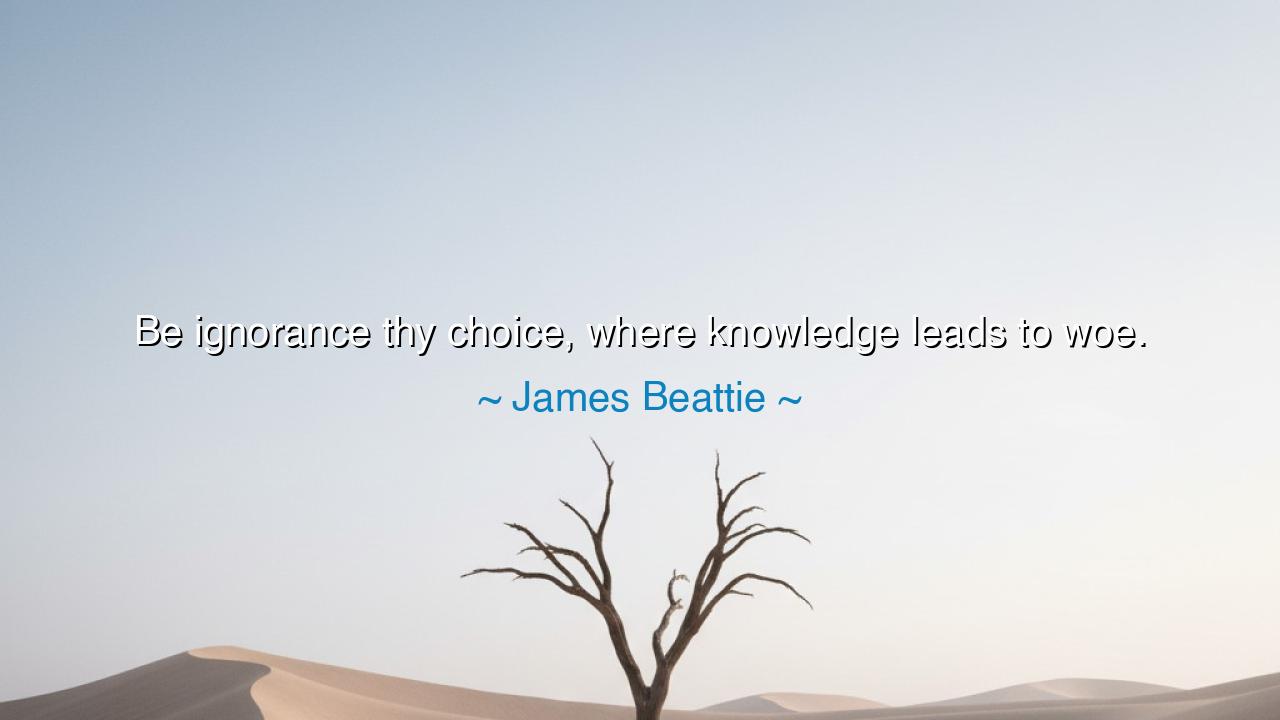
Be ignorance thy choice, where knowledge leads to woe.






The poet James Beattie once wrote with gentle sorrow and immortal wisdom: “Be ignorance thy choice, where knowledge leads to woe.” At first hearing, the words seem to wound the pride of reason, for has not mankind forever gloried in its pursuit of knowledge? Yet Beattie does not speak against wisdom itself, but against the kind of knowledge that brings grief without grace, that opens the eyes while it darkens the heart. His words are not the hymn of the fool, but the prayer of the wise man who has seen that truth, when stripped of mercy, can become a curse.
In the age of Enlightenment, when Beattie lived, the world trembled on the edge of discovery. Science was rising; reason was crowned as king. Yet amid that golden dawn, he saw shadows growing long—the pride of intellect untempered by compassion, the hunger for knowledge that forgot the soul. His cry was a warning: there are truths that can heal and truths that can harm; there is a light that illuminates, and another that blinds. Thus he taught that when knowledge leads to woe, when it robs peace, innocence, or wonder from the heart, one may rightly choose the sacred simplicity of ignorance, not as folly, but as protection.
Consider the tale of Oedipus, that ancient king of Thebes. He sought the truth of his birth with noble intent, believing that knowledge could free his people from plague. Yet when at last he found it, it destroyed him—he had slain his father and wed his mother. The truth was not false, yet it was fatal. His wisdom came too soon, his heart too proud to bear it. Thus, Beattie’s words echo from that old tragedy: there are doors the soul should open only when it has learned humility, for some knowledge is like fire—it warms the ready, but burns the unprepared.
So too in our own time, the lesson stands. The knowledge of destruction—of weapons, poisons, and manipulation—has far outpaced the wisdom to use it well. The human race, clever beyond measure yet unwise in heart, often suffers from the very fruits of its own brilliance. The poet foresaw this danger long before our age of steel and silicon. He knew that not all progress is good if it leaves compassion behind, that ignorance, when chosen in reverence for life, may preserve the joy and innocence that reason too easily steals.
Yet, let no one mistake Beattie’s counsel as a call to stagnation or superstition. He does not bid us turn from truth, but to weigh it with conscience. For there are truths that ennoble—the knowledge of love, of virtue, of the Creator’s order in all things—and there are those that burden, that drive the spirit into despair. When knowledge becomes woe, when it feeds vanity or kindles cruelty, then the wise heart steps back, choosing peace over pride, simplicity over sorrow.
Think of Adam and Eve, whose first act of disobedience was to eat from the Tree of Knowledge of Good and Evil. Their eyes were opened, yes—but to pain, to loss, to mortality. Their story is the eternal echo of Beattie’s warning: that not all enlightenment is blessed, and that sometimes, the veil that shields the heart is a mercy. The desire to know must always bow before the duty to love, for knowledge without goodness is like a sword in the hand of a child.
Therefore, O seeker of truth, temper your hunger for understanding with reverence. Ask not only, “Can I know this?” but also, “Should I?” Choose your knowledge as you would choose your companions—with care, humility, and foresight. When you feel that learning steals your peace, that understanding has turned your heart to stone, then remember Beattie’s counsel: choose ignorance where knowledge leads to woe. For in the silence of not knowing, the soul often hears the truest wisdom.
Let this be your guide through the labyrinth of life: seek knowledge that uplifts, not knowledge that enslaves. Learn to discern between the light that heals and the light that burns. For the greatest wisdom is not in knowing all things, but in knowing which truths to embrace and which to let pass by like shadows in the night. Be ignorance thy choice, then, not in blindness, but in serenity—and thus may your spirit walk in peace, even amidst the boundless mysteries of the world.






AAdministratorAdministrator
Welcome, honored guests. Please leave a comment, we will respond soon